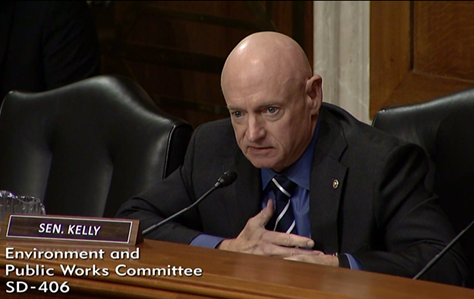WATCH: Kelly Highlights Urgency of Completing Projects to Combat Drought in Arizona
This week, during a Senate Environment and Public Works (EPW) Committee hearing, Arizona Senator Mark Kelly highlighted the urgency of implementing aquifer recharge projects in Arizona—a key component of drought resiliency improvement efforts for cities like Tucson.
Kelly, who championed legislation to require the U.S. Army Corps of Engineers to work with non-federal stakeholders to carry out aquifer recharge projects, discussed the urgency of implementing these reforms so critical drought resiliency projects can be constructed. During the hearing, Kelly highlighted a proposed groundwater recharge project in Tucson, which would save the city 4,000 acre-feet of water annually butcannot move forward without guidance from the Army Corps.

Click here to download video of Kelly’s remarks. See the transcript below:
Sen. Kelly: On a separate topic, I want to talk to you about managed aquifer recharge. I don’t easily get frustrated, but more than a year after WRDA [Water Resources Development Act] 2022 was signed into law, the Corps still hasn’t issued guidance to explain how non-federal sponsors can partner with the Corps to carry out managed aquifer recharge projects. This is authorized under Section 8108 of WRDA 2022.
As both of you may recall, this provision authorized three things. One, it required the Corps carry out a national assessment on how to carry out aquifer recharge projects. Number two, it required the Corps to establish a working group on managed aquifer recharge best practices. And three, it authorized the Corps to carry out managed aquifer recharge projects with non-federal sponsors.
Now as somebody who has championed these provisions, I want to note that all three of these are important, but the provisions are not intended to be implemented independently.
Mr. Connor, I noted you said in your testimony, that the working group would take longer to stand up because it would be considered an advisory committee. But that does not explain why the Corps has not issued implementation guidance explaining how army Corps districts can partner with local sponsors to carry out managed aquifer recharge projects as required in WRDA. This delay is having real consequences.
In Arizona, the city of Tucson reached out to the LA district nearly six months ago, and they’ve identified a project that would be a perfect match for this program. It would construct new groundwater recharge facilities and expand riparian habitat protection at the base of what’s called “A Mountain” in the city of Tucson. Once constructed, this project could help the City of Tucson save 4,000 acre-feet of water a year.
Look, time is of the essence here for Arizona. I mean, we are in a drought that has gone on for 20 years, it’s the worst drought in 1200 years. We had a good snowpack on the Colorado River last winter. So, we had a wet winter, and it’s been wet in Tucson last winter. It’s looking pretty good this winter. If we stand up groundwater recharge facilities quickly, we could build more resilience in what will certainly be a dry year, next year or the year after. So, it is critical to get this guidance and begin work on these groundwater recharge projects, especially in drought-stricken cities.
So, Mr. Connor, when do you expect the implementation guidance will be issued for the feasibility study portions of the managed aquifer recharge program, which is Section 8108 B. Why has this taken so long?
Michael Connor (Assistant Secretary of the Army for Civil Works): Senator, two quick points. So, the implementation guidance is still being drafted at this point in time. I will commit to you to go and personally see what I can do to move it as quickly as possible so that we can move forward with that project because I agree with you.
We want to be assisting these communities with respect to managed aquifer recharge. The second point I would just make is we are not waiting, though, to look for opportunities to support managed aquifer recharge. We are funding it through EI [Environmental Infrastructure] programs, Kyrene in your state. In Southern California, we are doing the same thing. We are also managing facilities different such as the Prado Dam in Southern California. We’re making releases differently of floodwater so they can be picked up by the local water district and put into their managed aquifer recharge system.
So, any opportunities, and I think we are doing the same thing at Lake Roosevelt now, trying to finish an EA [environmental assessment] to work with your water providers in your state. So, we want to move forward, notwithstanding the guidance but I understand the guidance is important. I will personally go back and see.
Sen. Kelly: I appreciate that. When you say as soon as possible, what do you think that means? When we can we get that implementation guidance or maybe generally, if you could expand on that.
Lieutenant General Scott A. Spellmon (55th Chief of Engineers and Commanding General, U.S. Army Corps of Engineers): Sir, I would just add, we are not waiting on implementation guidance. We are already implementing this in the field, and I will follow-up on the project in Arizona. We need three things. At the core project, we need a water supplier and water conservation authority. Our nonfederal sponsors typically will conduct the retention basin below the dam. The most important thing we need is the water. And the first time we really saw this was in California, in 2023 and we were able to make this use. We can move out with the guidance that we have, and I will follow up with my team on those projects you mentioned in Arizona.
Sen. Kelly: Alright, well, thank you. Thank you, Mr. Chairman.
